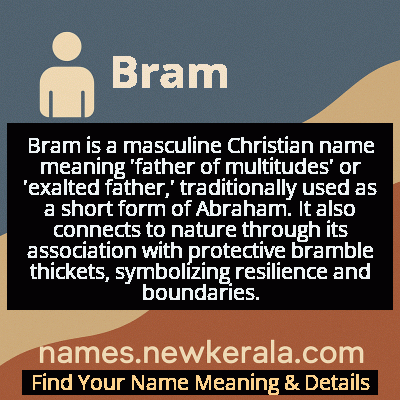Bram Name Meaning & Details
Origin, Popularity, Numerology Analysis & Name Meaning of Bram
Discover the origin, meaning, and cultural significance of the name BRAM. Delve into its historical roots and explore the lasting impact it has had on communities and traditions.
Name
Bram
Gender
Male
Origin
Christian
Lucky Number
7
Meaning of the Name - Bram
Bram is a masculine Christian name meaning 'father of multitudes' or 'exalted father,' traditionally used as a short form of Abraham. It also connects to nature through its association with protective bramble thickets, symbolizing resilience and boundaries.
Bram - Complete Numerology Analysis
Your Numerology Number
Based on Pythagorean Numerology System
Ruling Planet
Neptune (Ketu)
Positive Nature
Intuitive, analytical, spiritual, and inquisitive.
Negative Traits
Secretive, reserved, aloof, and can be overly critical.
Lucky Colours
Green, yellow.
Lucky Days
Monday.
Lucky Stones
Cat’s eye, moonstone.
Harmony Numbers
1, 5, 6.
Best Suited Professions
Scientists, researchers, spiritual leaders, detectives.
What People Like About You
Depth of knowledge, analytical skills, spirituality.
Famous People Named Bram
Bram Stoker
Author
Created the iconic vampire Count Dracula in his 1897 Gothic novel
Bram Moolenaar
Software Developer
Developed the Vim text editor, essential tool for programmers worldwide
Bram Fischer
Lawyer & Activist
Defended Nelson Mandela and fought against apartheid in South Africa
Bram van der Stok
Military Pilot
Successful escaper from Stalag Luft III in the famous 'Great Escape'
Name Variations & International Equivalents
Click on blue names to explore their detailed meanings. Gray names with will be available soon.
Cultural & Historical Significance
The name's Christian significance is profound, connecting directly to Abraham's story of faith and divine promise. This biblical foundation gives Bram a sense of historical depth and spiritual weight. Meanwhile, its Dutch origins make it a staple in Low Countries naming traditions, where it evolved beyond its Hebrew roots to become a distinct given name. The literary connection to Bram Stoker created a modern cultural touchstone that introduced the name to global audiences, associating it with creativity, darkness, and enduring storytelling. This multifaceted cultural heritage makes Bram a name that bridges religious tradition, European history, and popular culture in unique ways.
Extended Personality Analysis
Individuals named Bram are often perceived as intelligent, creative, and determined. They tend to possess strong analytical minds combined with artistic sensibilities, making them effective problem-solvers who approach challenges from unique perspectives. Their connection to the name's literary heritage often manifests in strong communication skills and storytelling abilities. Bram's typically exhibit quiet confidence rather than overt assertiveness, preferring substance over showmanship. They're known for their loyalty and depth in personal relationships, though they may maintain a certain reserve with strangers.
The name's association with brambles suggests a protective nature—people who create safe boundaries for those they care about while being resilient enough to thrive in challenging circumstances. Their combination of traditional values and innovative thinking makes them both grounded and forward-looking individuals. Bram's often display a thoughtful, introspective quality, taking time to consider decisions carefully before acting. They tend to be reliable and consistent, with a strong sense of personal integrity that guides their actions. While they may not seek the spotlight, they often excel in leadership roles through their competence and genuine care for others. The name suggests someone who balances intellectual depth with practical capability, making them valued colleagues and trusted friends.
Modern Usage & Popularity
In contemporary times, Bram has experienced a resurgence as parents seek traditional yet distinctive names. It ranks consistently in the top 500 names in the Netherlands and Belgium, where it maintains strong cultural roots. In English-speaking countries, it has moved from relative obscurity to moderate popularity, particularly among parents drawn to short, strong biblical names that aren't overly common. The name appeals to modern sensibilities through its literary connections, natural imagery, and international flair. Its brevity (single syllable) aligns with current naming trends favoring concise, impactful names. While not among the most popular names, Bram has shown steady growth in usage charts, particularly in the United States, United Kingdom, and Canada, where it strikes a balance between familiarity and uniqueness. The name's versatility allows it to fit well in both traditional and contemporary contexts, making it an appealing choice for modern parents looking for a name with depth and character.
Symbolic & Spiritual Meanings
Bram carries rich symbolic meanings derived from its dual heritage. As a diminutive of Abraham, it symbolizes fatherhood, faith, and covenant—representing the foundation of great traditions and the promise of future generations. The bramble association introduces powerful natural symbolism: thorns represent protection and boundaries, while the dense thicket suggests complexity, resilience, and the untamed aspects of nature. In Celtic symbolism, brambles were seen as protective barriers against evil spirits, adding a layer of mystical safeguarding. The fruit of the bramble (blackberries) symbolizes abundance and the sweetness that comes from navigating life's challenges. Together, these elements create a name that represents strength through adversity, protective love, intellectual depth, and the balance between cultivated tradition and wild creativity. The name embodies the idea that true strength often comes with protective boundaries, and that great rewards require navigating some difficulties along the way.

